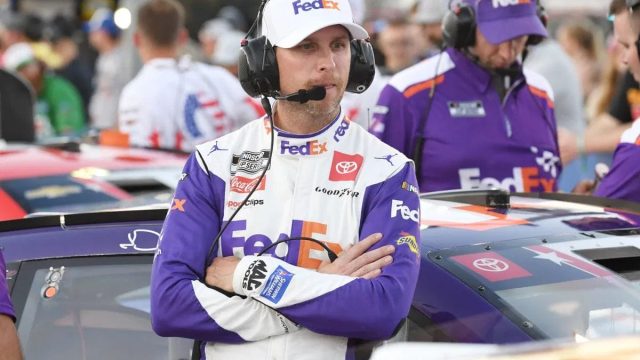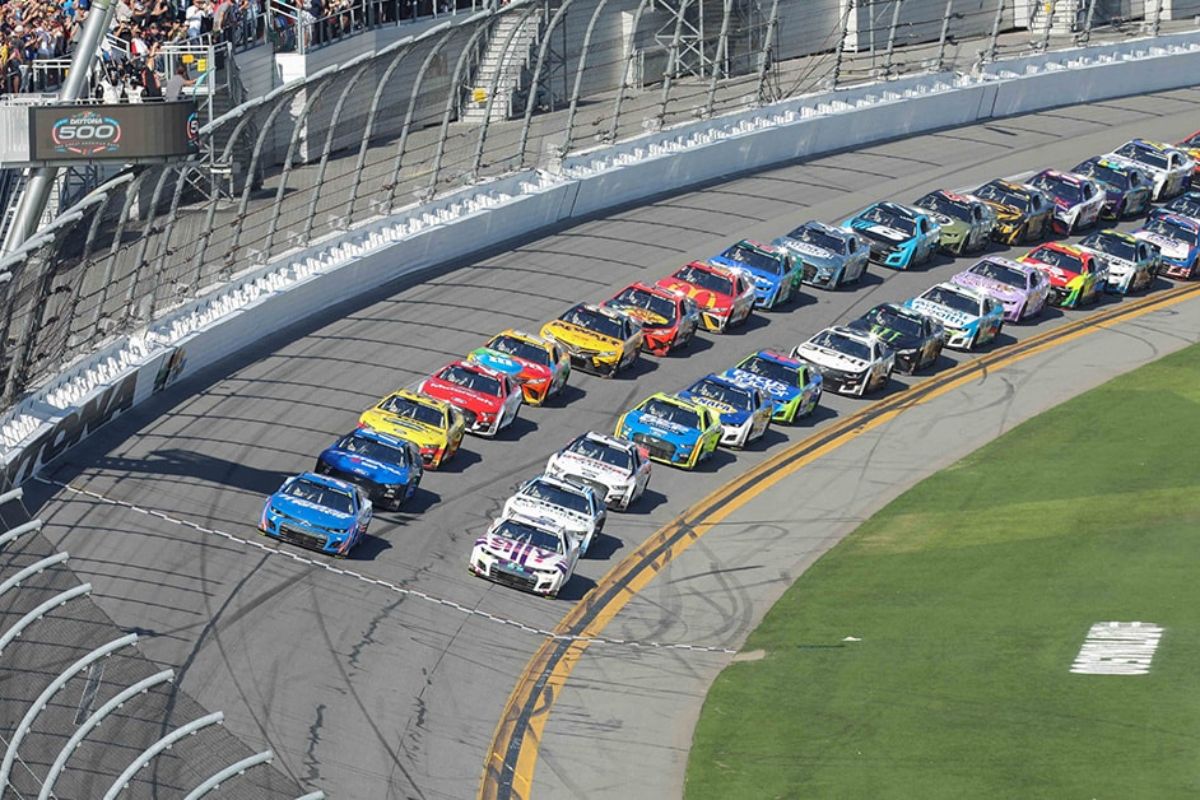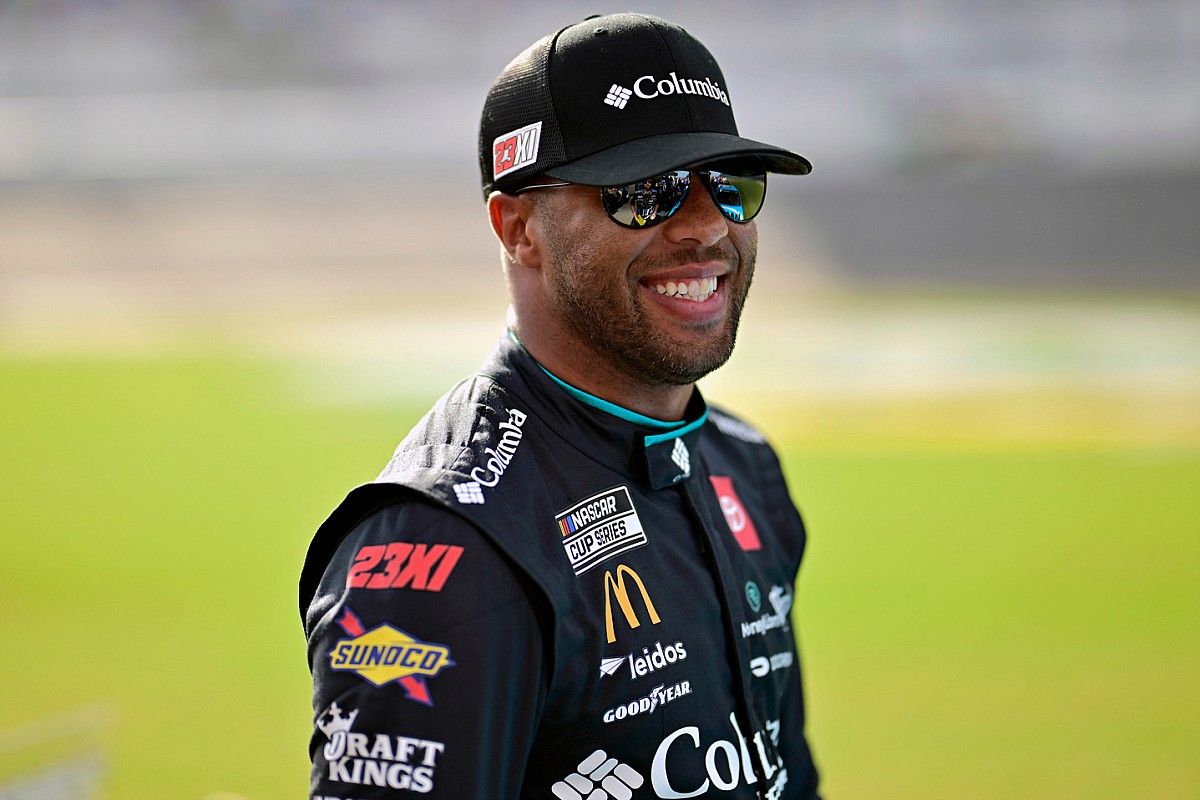Denny Hamlin Criticizes NASCAR’s Late-Race Crash Decision: Denny Hamlin‘s recent critique of NASCAR’s handling of late-race crashes has ignited a notable discourse about the integrity and safety of the sport. By labeling the situation a “trainwreck,” he emphasizes the urgent need for clearer regulations and accountability, particularly during the playoff season. Hamlin’s insights reflect a growing unease among competitors regarding aggressive racing tactics that could undermine the fairness fans expect. As these concerns resonate within the racing community, the implications for NASCAR’s regulatory framework and competitive culture warrant closer examination. What changes might be necessary to restore confidence in the sport?
Key Highlights
- Denny Hamlin commends NASCAR’s stricter regulations but warns against unchecked aggression leading to a “trainwreck” in racing.
- He emphasizes the need for clear rules to maintain competitive integrity and driver accountability in high-stakes situations.
- Hamlin criticizes aggressive tactics during playoffs, highlighting concerns about fairness and potential fan disillusionment.
- He cites his own championship aspirations impacted by deliberate wrecks, underscoring the significance of late-race decisions.
- Hamlin calls for NASCAR to actively enforce new precedents to promote honorable competition and prevent chaos on track.
Denny Hamlin’s Stance on NASCAR’s Late-Race Crash Ruling
In the wake of NASCAR’s recent ruling on late-race crashes, Denny Hamlin has articulated a perspective that balances recognition of the sport’s inherent physicality with a call for accountability.
Hamlin, a seasoned competitor, commends NASCAR’s decision to impose stricter regulations on aggressive driving tactics, particularly in the context of late-race incidents. He posits that while NASCAR is fundamentally a contact sport, allowing unchecked desperation among drivers can lead to dangerous outcomes that compromise both safety and the integrity of the race.
Hamlin emphasizes the importance of setting clear boundaries for acceptable behavior on the track. He believes that the recent ruling against Austin Dillon serves as a critical moment, signaling NASCAR’s commitment to enforcing standards that discourage recklessness. This ruling is not merely punitive; it establishes a precedent that encourages drivers to engage in tactical, rather than erratic, actions during vital race moments.
While acknowledging that this decision will not fundamentally alter the competitive nature of racing, Hamlin insists that accountability is necessary for the sport’s progression.
By addressing late-race crashes with a decisive stance, NASCAR can foster an environment where skill and strategy take precedence over reckless aggression. In Hamlin’s view, this shift is essential for maintaining the sport’s allure and ensuring the safety of all participants.
Hamlin’s Personal Experience with Late-Race Crashes
Denny Hamlin’s perspective on late-race crashes is further informed by his own personal experiences as a competitor in NASCAR. His encounters with rival drivers have left a notable mark on his career, shaping his views on the implications of NASCAR’s recent decision-making regarding late-race incidents.
One remarkable instance occurred during the 2020 season, where Hamlin found himself on the brink of competing in the Championship 4 race, only to be thwarted by a deliberate wreck instigated by Kevin Harvick. This incident not only affected Hamlin’s championship aspirations but also emphasized the broader issues of driver conduct in critical race moments.
The following points demonstrate the consequences of late-race crashes from Hamlin’s perspective:
- Impact on Championship Race: Hamlin’s potential loss of a championship opportunity exemplifies how late-race decisions can directly affect the outcomes for multiple drivers.
- Driver Accountability: The decisions made by NASCAR regarding penalties for intentional wrecks raise questions about the responsibility of drivers in high-stakes situations.
- Fan Perception: Late-race crashes risk diminishing the integrity of the sport, as fans may become disillusioned with perceived unfairness in competition.
Hamlin’s experiences highlight the need for a more robust framework within NASCAR to address late-race incidents, ensuring that competitive integrity is preserved while fostering a safer racing environment.
The Importance of NASCAR Setting a Precedent
Establishing a clear and consistent precedent is crucial for NASCAR, particularly in view of recent controversies surrounding late-race incidents. The integrity of the sport hinges on the enforcement of rules that deter unfair practices while promoting competitive fairness. Denny Hamlin’s call for a definitive stance from NASCAR emphasizes the necessity for governing bodies to maintain a steadfast approach in their rule application, especially concerning playoff implications.
“I think there will be an opportunity when we go to Martinsville, and when we get to these other lower series, the last few years have been an absolute trainwreck of racing. Moments like this in our sport, there’s always opportunities to grow from it and get better, and hopefully, both sides get better.” – hamlin
Historically, NASCAR has refrained from disqualifying drivers who secure playoff spots through dubious means, focusing instead on guaranteeing that races reflect skill and strategy rather than opportunistic tactics. The recent actions of drivers like Austin Dillon, who instigated a late-race crash, highlight the potential for rule bending, which could undermine the sport’s credibility.
While such incidents may captivate audiences, they also risk cultivating a perception of chaos and unpredictability that detracts from the core of racing. Hamlin’s assertion that NASCAR must actively police its new precedent is critical.
As the series anticipates events like Martinsville, where aggressive tactics often come into play, it is imperative for NASCAR officials to reinforce their commitment to fair racing. By setting clear guidelines and consistently applying them, NASCAR can foster an environment where drivers are incentivized to compete honorably.
Hamlin’s Concerns About Fairness in the Playoffs
Concerns surrounding fairness in the NASCAR playoffs have been amplified by recent incidents that raise questions about competitive integrity. Denny Hamlin’s remarks highlight the potential for controversy when drivers resort to aggressive tactics to secure playoff advancement. In particular, he referenced Kevin Harvick’s action against Kyle Busch, which he believed was a deliberate attempt to eliminate a competitor in a critical moment of the season. This incident emphasizes the precarious balance between competitive strategy and sportsmanship.
“He might not like this, but when Kevin Harvick spun out Kyle Busch, now it didn’t result in him making it but he was trying to wreck Kyle to make the next round, and that would’ve knocked me out. Now, is that fair? That’s not fair; he shouldn’t be able to wipe someone out to move on to the next round.” – Hamlin
Hamlin’s comments prompt an examination of the underlying principles that govern playoff racing. His assertion that Harvick’s actions were unfair suggests a broader concern about the implications of such tactics on the playoff system. The potential for drivers to prioritize personal advancement over fair competition poses considerable risks to the sport’s integrity.
- The necessity for clear rules governing driver conduct during critical playoff moments.
- The impact of aggressive driving tactics on the perception of fairness among competitors.
- The potential erosion of fan trust if incidents are perceived as compromising competitive integrity.
As the playoffs progress, the need for NASCAR to address these concerns becomes increasingly crucial. Ensuring that the sport maintains a commitment to fairness will not only uphold the competitive spirit but also safeguard the trust of fans and participants similarly.
Bubba Wallace’s Playoff Situation
Steering through the playoff landscape, Bubba Wallace finds himself in a precarious position just outside the cutline. With only two races remaining in the regular season, the urgency for Wallace to secure his playoff spot has intensified. His recent performance, including two top-five finishes, positioned him favorably until a late-race crash at Michigan International Speedway derailed his momentum, leaving him in 26th place with considerable damage to his car.
Now, he stands just a point adrift from the playoff threshold. Wallace’s immediate strategy must pivot from accumulating points to securing a win, as he acknowledges that only a victory can guarantee his advancement. “Two races left; we’re still in the game, so throw Michigan away and on to Daytona,” he stated post-race, emphasizing the need to refocus on upcoming opportunities.
Our guys did a good job … to show up here with speed and made it better from practice. Had good track position all day, and it just didn’t work out.” – wallace
Daytona International Speedway has historically favored Wallace, which adds a layer of optimism to his playoff pursuit. However, the competitive landscape is complicated by the presence of three drivers likewise entrenched in the battle for the final playoff spot.
As Wallace prepares for Daytona, the stakes will certainly lead to aggressive racing tactics. The dynamics of this scenario may invoke a paradox for his team owner, Denny Hamlin, who has criticized such actions yet may find himself conflicted as Wallace navigates the challenges ahead.
News in Brief: Denny Hamlin Criticizes NASCAR’s Late-Race Crash Decision
To conclude, Denny Hamlin’s critique of NASCAR’s late-race crash decisions highlights important concerns regarding competitive integrity and safety in the sport. His emphasis on the need for stricter regulations and accountability emphasizes the potential consequences of aggressive tactics during critical playoff moments. As these issues threaten the fairness of racing, it becomes crucial for NASCAR to establish consistent guidelines that promote honorable competition and maintain fan trust. Addressing these challenges is vital for the sport’s future viability.
ALSO READ: Denny Hamlin on Corey LaJoie’s Car Flip: “I’d Rather Roll Over”



